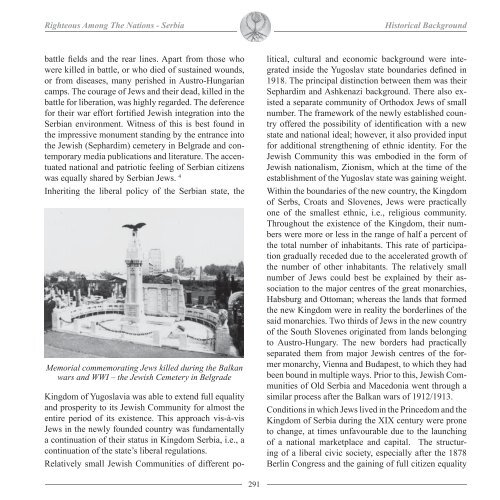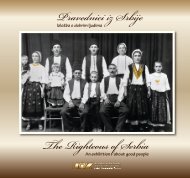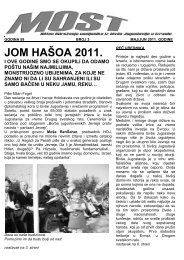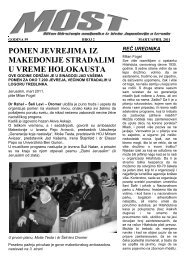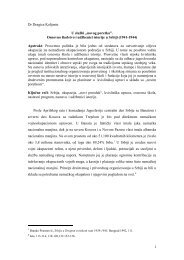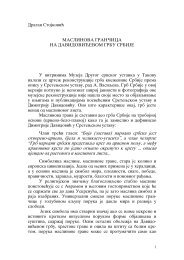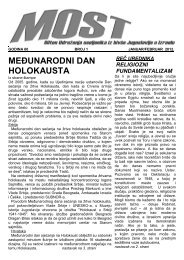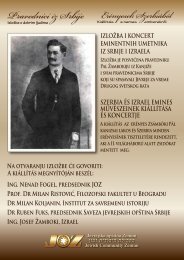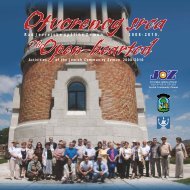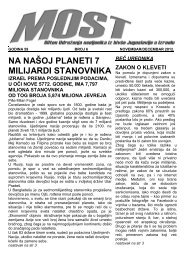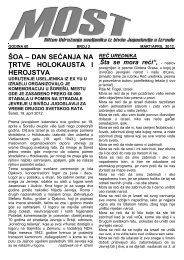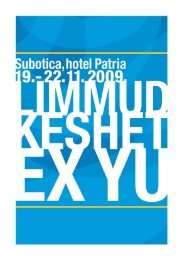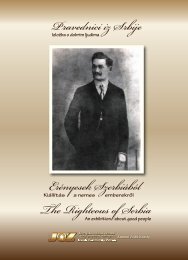Book on the Righteous - Jevrejska opština Zemun
Book on the Righteous - Jevrejska opština Zemun
Book on the Righteous - Jevrejska opština Zemun
You also want an ePaper? Increase the reach of your titles
YUMPU automatically turns print PDFs into web optimized ePapers that Google loves.
<strong>Righteous</strong> Am<strong>on</strong>g The Nati<strong>on</strong>s - Serbia<br />
Historical Background<br />
battle fields and <strong>the</strong> rear lines. Apart from those who<br />
were killed in battle, or who died of sustained wounds,<br />
or from diseases, many perished in Austro-Hungarian<br />
camps. The courage of Jews and <strong>the</strong>ir dead, killed in <strong>the</strong><br />
battle for liberati<strong>on</strong>, was highly regarded. The deference<br />
for <strong>the</strong>ir war effort fortified Jewish integrati<strong>on</strong> into <strong>the</strong><br />
Serbian envir<strong>on</strong>ment. Witness of this is best found in<br />
<strong>the</strong> impressive m<strong>on</strong>ument standing by <strong>the</strong> entrance into<br />
<strong>the</strong> Jewish (Sephardim) cemetery in Belgrade and c<strong>on</strong>temporary<br />
media publicati<strong>on</strong>s and literature. The accentuated<br />
nati<strong>on</strong>al and patriotic feeling of Serbian citizens<br />
was equally shared by Serbian Jews. 4<br />
Inheriting <strong>the</strong> liberal policy of <strong>the</strong> Serbian state, <strong>the</strong><br />
Memorial commemorating Jews killed during <strong>the</strong> Balkan<br />
wars and WWI – <strong>the</strong> Jewish Cemetery in Belgrade<br />
Kingdom of Yugoslavia was able to extend full equality<br />
and prosperity to its Jewish Community for almost <strong>the</strong><br />
entire period of its existence. This approach vis-à-vis<br />
Jews in <strong>the</strong> newly founded country was fundamentally<br />
a c<strong>on</strong>tinuati<strong>on</strong> of <strong>the</strong>ir status in Kingdom Serbia, i.e., a<br />
c<strong>on</strong>tinuati<strong>on</strong> of <strong>the</strong> state’s liberal regulati<strong>on</strong>s.<br />
Relatively small Jewish Communities of different po-<br />
litical, cultural and ec<strong>on</strong>omic background were integrated<br />
inside <strong>the</strong> Yugoslav state boundaries defined in<br />
1918. The principal distincti<strong>on</strong> between <strong>the</strong>m was <strong>the</strong>ir<br />
Sephardim and Ashkenazi background. There also existed<br />
a separate community of Orthodox Jews of small<br />
number. The framework of <strong>the</strong> newly established country<br />
offered <strong>the</strong> possibility of identificati<strong>on</strong> with a new<br />
state and nati<strong>on</strong>al ideal; however, it also provided input<br />
for additi<strong>on</strong>al streng<strong>the</strong>ning of ethnic identity. For <strong>the</strong><br />
Jewish Community this was embodied in <strong>the</strong> form of<br />
Jewish nati<strong>on</strong>alism, Zi<strong>on</strong>ism, which at <strong>the</strong> time of <strong>the</strong><br />
establishment of <strong>the</strong> Yugoslav state was gaining weight.<br />
Within <strong>the</strong> boundaries of <strong>the</strong> new country, <strong>the</strong> Kingdom<br />
of Serbs, Croats and Slovenes, Jews were practically<br />
<strong>on</strong>e of <strong>the</strong> smallest ethnic, i.e., religious community.<br />
Throughout <strong>the</strong> existence of <strong>the</strong> Kingdom, <strong>the</strong>ir numbers<br />
were more or less in <strong>the</strong> range of half a percent of<br />
<strong>the</strong> total number of inhabitants. This rate of participati<strong>on</strong><br />
gradually receded due to <strong>the</strong> accelerated growth of<br />
<strong>the</strong> number of o<strong>the</strong>r inhabitants. The relatively small<br />
number of Jews could best be explained by <strong>the</strong>ir associati<strong>on</strong><br />
to <strong>the</strong> major centres of <strong>the</strong> great m<strong>on</strong>archies,<br />
Habsburg and Ottoman; whereas <strong>the</strong> lands that formed<br />
<strong>the</strong> new Kingdom were in reality <strong>the</strong> borderlines of <strong>the</strong><br />
said m<strong>on</strong>archies. Two thirds of Jews in <strong>the</strong> new country<br />
of <strong>the</strong> South Slovenes originated from lands bel<strong>on</strong>ging<br />
to Austro-Hungary. The new borders had practically<br />
separated <strong>the</strong>m from major Jewish centres of <strong>the</strong> former<br />
m<strong>on</strong>archy, Vienna and Budapest, to which <strong>the</strong>y had<br />
been bound in multiple ways. Prior to this, Jewish Communities<br />
of Old Serbia and Maced<strong>on</strong>ia went through a<br />
similar process after <strong>the</strong> Balkan wars of 1912/1913.<br />
C<strong>on</strong>diti<strong>on</strong>s in which Jews lived in <strong>the</strong> Princedom and <strong>the</strong><br />
Kingdom of Serbia during <strong>the</strong> XIX century were pr<strong>on</strong>e<br />
to change, at times unfavourable due to <strong>the</strong> launching<br />
of a nati<strong>on</strong>al marketplace and capital. The structuring<br />
of a liberal civic society, especially after <strong>the</strong> 1878<br />
Berlin C<strong>on</strong>gress and <strong>the</strong> gaining of full citizen equality<br />
291


